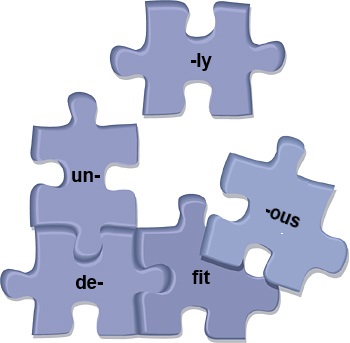

Prefixes and Suffixes3rd Grade |
|
|---|---|
Alabama Course of Study Standards: 7 |
|
Demonstrate advanced phonemic awareness skills in spoken words. Examples: Say smoke . Now say smoke , but don’t say /m/. (soak) Say best . Now say best , but don't say /s/. (bet) Examples : Say sweep . Now say sweep , but change the / w / to /l/. (sleep) Say list . Now say list , but change the /s/ to /f/. (lift) Examples: Say safe . Now say safe but say the last sound first and the first sound last. ( face ) Say slack . Now say slack but say the last sound first and the first sound last. (class) Examples: sap, lap, lip, slip, slit, lit; gob, cob, cub, cup, cap; train, rain, lane, lame, blame Examples: Say photograph . Change graph to cell. (photocell) Say anytime . Change time to where. (anywhere) Say blocked . Change /t/ to / ing/. (blocking) |
|
Arizona Academic Standards: 3.RF.3.aCommon Core State Standards: Literacy.RF.3.3aGeorgia Math and ELA Standards: ELAGSE3RF3aKentucky Academic Standards (KAS): RF.3.3.aMississippi College- and Career-Readiness Standards: RF.3.3aNorth Carolina - Standard Course of Study: RF.3.4.aNew York State Next Generation Learning Standards: 3RF3a |
|
Identify and know the meaning of the most common prefixes and derivational suffixes. |
|
Tennessee Academic Standards: 3.FL.PWR.3.a |
|
Identify and define the meaning of the most common prefixes and derivational suffixes. |
|
Arizona Academic Standards: 3.RF.3.bCommon Core State Standards: Literacy.RF.3.3bGeorgia Math and ELA Standards: ELAGSE3RF3bKentucky Academic Standards (KAS): RF.3.3.bMississippi College- and Career-Readiness Standards: RF.3.3bNorth Carolina - Standard Course of Study: RF.3.4.b |
|
Decode words with common Latin suffixes. |
|
New York State Next Generation Learning Standards: 3RF3c |
|
Identify, know the meanings of, and decode words with suffixes. |
|
Tennessee Academic Standards: 3.FL.PWR.3.b |
|
Decode words with common Latin suffixes, such as -ly, -less, and -ful. |
|
Arizona Academic Standards: 3.RF.3.c |
|
Apply knowledge of the six syllable types to read grade-level words accurately. |
|
Common Core State Standards: Literacy.RF.3.3cGeorgia Math and ELA Standards: ELAGSE3RF3cKentucky Academic Standards (KAS): RF.3.3.cMississippi College- and Career-Readiness Standards: RF.3.3cNorth Carolina - Standard Course of Study: RF.3.4.cNew York State Next Generation Learning Standards: 3RF3b |
|
Decode multisyllable words. |
|
Tennessee Academic Standards: 3.FL.PWR.3.c |
|
Decode multi-syllable words. |
|
Wisconsin Academic Standards: RF.3.3.c |
|
Decode multisyllable words that include all learned syllable patterns (see previous grade level standards for specific targets). |
|
Texas Essential Knowledge and Skills (TEKS): 3.1.A* |
|
decode multisyllabic words in context and independent of context by applying common spelling patterns including: |
|
Texas Essential Knowledge and Skills (TEKS): 3.4.A* |
|
identify the meaning of common prefixes (e.g., in-, dis-) and suffixes (e.g., -full, - less), and know how they change the meaning of roots |
|
Pennsylvania Core Standards: CC.1.1.3.D |
|
Know and apply grade-level phonics and word analysis skills in decoding words.
|
|
Georgia Math and ELA Standards: 3.L.V.2.a |
|
Deconstruct words using common roots, root words, and affixes to determine meaning. (I) |
|
Georgia Math and ELA Standards: 3.L.V.2.b |
|
Identify affixes associated with specific parts of speech (e.g., *ly* is commonly used with adverbs) to aid comprehension. (I) |
|
 3rd Grade Reading - Prefixes and Suffixes Lesson
3rd Grade Reading - Prefixes and Suffixes Lesson




